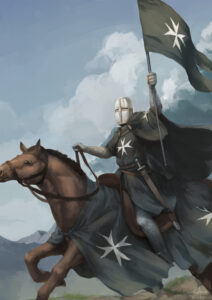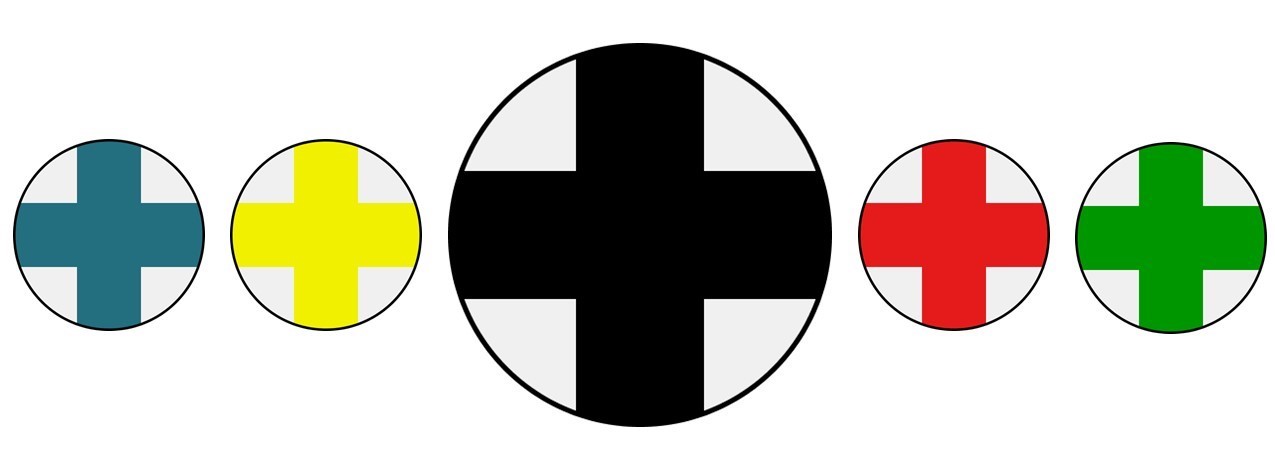The Kotaran faith is a human religion and philosophy that believes that there is strength and power when the universe is balanced. They believe that most things in nature are symmetrical for a reason – most creatures have two of everything (eyes, ears, limbs) that match symmetrically, and where they have one of something (like the nose or mouth), it’s centered. And even more strength is derived from a quadratic balance, when things are symmetrical or balance both horizontally and vertically.
In nature, what isn’t binary tends to be split in quarters. The four seasons: winter, spring, summer, and autumn. The four main phases of the moon: new, waxing, full, waning. The four elements: air, earth, fire, water. The cardinal directions: north, east, south, west. Basic mathematical operations: addition, subtraction, multiplication, and division.
There are four Gods of the Kotara faith, aspects of the Unified Kotara, though some Kotarans believe these are not conscious, sentient gods so much as the elemental forces of nature: air, water, earth, and fire.
Many Kotaran priests worship the balance as a whole and do not worship an individual god, and but rarely mention each individual god by name. But some communities whose way of life is tied to a particular element may claim that God by name – fishermen and seafaring traders may see Amanzi as their patron, while those in a mining community might claim the patronage of Intaba and others in a high, windy mountaintop community might claim Umoya. This also goes for specific professions within general Kotaran communities. Soldiers tend to lean towards Ilanga, scholars towards Umoya, and so forth.
 Kotaran priests advocate for a balance between law and chaos (the collective good versus individualism) and between good and evil (altruism versus selfishness). While policies for the collective good are necessary for common defense and law and order, these need to be balanced with protecting individual liberties. While altruism is certainly laudable, this needs to be balanced with a certain amount of “selfishness” for self-care and self-reliance. While this may sound like Kotaran priests lean towards a True Neutral alignment, and some are, many tend to lean a bit more towards the collective good and altruism.
Kotaran priests advocate for a balance between law and chaos (the collective good versus individualism) and between good and evil (altruism versus selfishness). While policies for the collective good are necessary for common defense and law and order, these need to be balanced with protecting individual liberties. While altruism is certainly laudable, this needs to be balanced with a certain amount of “selfishness” for self-care and self-reliance. While this may sound like Kotaran priests lean towards a True Neutral alignment, and some are, many tend to lean a bit more towards the collective good and altruism.
There are many who see the Kotaran faith as more of a philosophical belief rather than a religion. They draw strength from their belief in the balance of all things in nature rather than from the Kotaran gods themselves. As such, there are many practitioners of Kotaran philosophy who worship other gods or none at all. Some are even Kotaran priests, drawing divine power from the strength of their philosophical beliefs rather than from the gods themselves.
Each Kotaran god has dominion over both Life and Death. In addition, some have greater sway over the other domains.
The Kotara faith’s symbol is a cross, depicted either as + or X. When presented in a medium that can show color (painted, for example, as opposed to whittled wood or carved stone), the Kotara’s symbol is general a black cross on a white field, though occasionally alternated as a white cross on a black field. But each individual God has a similar symbol generally only differentiated by color. The gods themselves are general depicted as being without gender or of all genders. They are often shown as the raw element, though may sometimes be depicted as anthropomorphized version of the elemental material. None of the gods are evil, though they are at their best when balanced and working in harmony together.
Some demihuman races have been known to worship individual Kotaran gods without adhering to the Kotaran faith as a whole, though less commonly than to other gods. This is particularly true of races and species with strong elemental affinities, like the genasi.
The Kotaran Gods
Note: while some priests pay particular homage to one of the Kotaran gods, and must choose a domain of that god, most priests worship the balance of the Kotaran as a whole and may choose any domain.
Kotara – The union of all the gods, also known as the Balance. Primary Domains: All
Umoya – God of Air. Symbol: yellow or light blue cross on a white background, or white cross on a yellow or light blue. Primary Domains: Arcana, Grave, Knowledge, Life, Light, Order, Peace, Twilight, Death.
Ilanga – God of Fire. Symbol: red cross on a white background, or white cross on a red background. Primary Domains: Forge, Grave, Life, Light, Order, Peace, Trickery, Twilight, War, Death.
Amanzi – God of Water. Symbol: turquoise cross on a white background, or white cross on a turquoise background. Primary Domains: Grave, Life, Nature, Order, Peace, Tempest, Trickery, Twilight, Death.
Intaba – God of Earth. Symbol: brown or dark green cross on a white background, or white cross on a brown or dark green background. Primary Domains: Grave, Life, Nature, Order, Peace, Tempest, Twilight, War, Death.
By Domain
Arcana – Umoya (Air)
Death – Umoya (Air), Ilanga (Fire), Amanzi (Water), Intaba (Earth)
Forge – Ilanga (Fire)
Grave – Umoya (Air), Ilanga (Fire), Amanzi (Water), Intaba (Earth)
Knowledge – Umoya (Air)
Life – Umoya (Air), Ilanga (Fire), Amanzi (Water), Intaba (Earth)
Light – Ilanga (Fire), Umoya (Air)
Nature – Intaba (Earth), Amanzi (Water)
Order – Umoya (Air), Ilanga (Fire), Amanzi (Water), Intaba (Earth)
Peace – Umoya (Air), Ilanga (Fire), Amanzi (Water), Intaba (Earth)
Tempest – Amanzi (Water), Intaba (Earth)
Trickery – Amanzi (Water), Ilanga (Fire)
Twilight – Umoya (Air), Ilanga (Fire), Amanzi (Water), Intaba (Earth)
War – Ilanga (Fire), Intaba (Earth)

